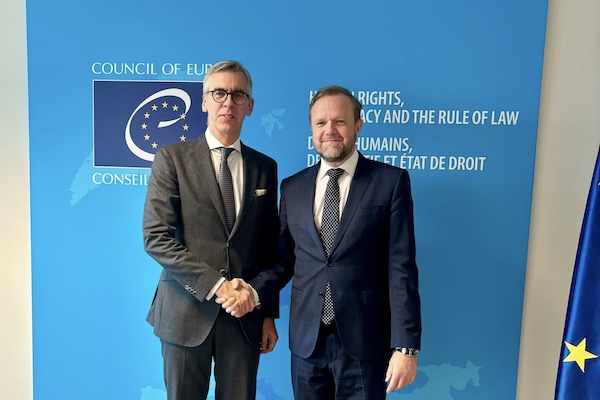 (L-R) Léon Gloden, Luxembourg's Minister for Home Affairs; Bjørn Berge, Deputy Secretary General of the Council of Europe;
Credit: MAINT
(L-R) Léon Gloden, Luxembourg's Minister for Home Affairs; Bjørn Berge, Deputy Secretary General of the Council of Europe;
Credit: MAINT
On Wednesday 26 March 2025, as part of Luxembourg's Presidency of the Council of Europe's Committee of Ministers, Luxembourg’s Minister for Home Affairs, Léon Gloden, delivered a speech at the 48th session of the Congress of Local and Regional Authorities in Strasbourg, France.
The presidency, which began on Wednesday 13 November 2024, will end on Wednesday 14 May 2025.
As reported by the Ministry for Home Affairs, Minister Gloden used his speech to emphasise Luxembourg's commitment to international cooperation and the protection of fundamental rights. He stated: "Europe, with its values, must reaffirm its commitment to a vibrant and agile local and regional democracy, capable of meeting contemporary challenges.”
In the face of threats such as populism, misinformation and polarisation, Minister Gloden highlighted the importance of transparent and participatory local governance and praised the key role of the Congress in supporting local elected officials and promoting grassroots democracy.
Addressing the issue of free movement in Europe, the minister reaffirmed Luxembourg's opposition to internal border controls within the Schengen Area, advocating for strengthened controls at external borders. He declared: "Schengen is all of us. It is essential to avoid any unnecessary disruption of cross-border traffic and to preserve our shared way of life.”
The minister reminded everyone that Europe is built every day at the local and regional level and that the Council of Europe plays a fundamental role in preserving peace, democracy and fundamental rights. He concluded: “Our strength lies in our unity and our common commitment to a better future. Long live Europe and long live the Council of Europe.”
During his visit to Strasbourg, Minister Gloden also held bilateral discussions with the Deputy Secretary General of the Council of Europe, Bjørn Berge, as well as with the President of the Congress of Local and Regional Authorities, Marc Cools, and the Secretary General of the Congress, Mathieu Mori. Among the topics discussed were municipal mergers, the future of the Schengen Area and its borders, as well as twinning and collaborations between municipalities.
SM








